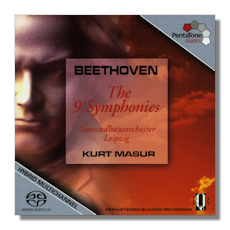
The Internet's Premier Classical Music Source
Related Links
- Beethoven Reviews
- Latest Reviews
- More Reviews
-
By Composer
-
Collections
DVD & Blu-ray
Books
Concert Reviews
Articles/Interviews
Software
Audio
Search Amazon
Recommended Links
Site News
 SACD Review
SACD Review
Ludwig van Beethoven

The Nine Symphonies
- Symphony #1 in C Major, Op. 21
- Symphony #2 in D Major, Op. 36
- Symphony #3 "Eroica" in E Flat Major, Op. 55
- Symphony #4 in B Flat Major, Op. 60
- Symphony #5 in C minor, Op. 67
- Symphony #6 "Pastoral" in F Major, Op. 68
- Symphony #7 in A Major, Op. 92
- Symphony #8 in F Major, Op. 93
- Symphony #9 "Choral" in D minor, Op. 125 *
* Anna Tomowa-Sintow, soprano
* Annelies Burmeister, mezzo-soprano
* Peter Schreier, tenor
* Theo Adam, bass
* Radio Chorus Leipzig
Gewandhaus Orchestra Leipzig/Kurt Masur
Pentatone Classics PTC5186159 5 Hybrid Multichannel SACDs
These symphonies were originally recorded for Philips in 1972 (Nos. 4, 5 & 7), 1973 (Nos. 3 & 6) and 1974 (Nos. 1, 2, 8 & 9). In general the readings are solid, middle-of-the-road affairs, with good sound for their day, but not up-close and as vivid as the state-of-recordings today. Probably the greatest strength of the set is its consistency of approach: Masur does not impose his personality on the music, preferring instead to present rather straightforward performances and let the music speak for itself. And, as we all know, this music can speak for itself quite boldly – listening after listening.
Among the strongest performances here are #4, where tempos seem perfect and the orchestra plays with such vitality and spirit. #6, too, is quite fine, even if tempos are bit more relaxed than I generally prefer. The Ninth is interesting, the one performance here in which Masur pulls tempos about somewhat (try the finale), but to generally good effect. His soloists aren't the biggest names, but they do just fine and so does the chorus.
The Eroica is good, again a bit relaxed in approach, but Masur eschews the first movement repeat, a fatal flaw for some listeners. To me, this once-common abridgement does not ruin a performance, but the structure of the whole first movement shifts out of balance, the weight tilting toward the development and reprise, leaving the single exposition unable to uphold its end. The Fifth is solidly conceived and well played, but could have more tension and drive.
Of the sets in my collection: Toscanini, Szell, Jochum, Harnoncourt, Drahos, Abbado, Gielen and perhaps a few others, I prefer the Abbado/Berlin Philharmonic on DG, and, on DVD, the Gielen/SWR Sinfonieorchester on EuroArts. Of course, Toscanini, in his various sets, has much to offer, but in dated sound. Szell and Jochum are both fine, but the former routinely eliminated repeats. Harnoncourt is quite excellent, too, and I suppose I could name a few others in individual performances who are first-rate. Karajan, whose readings I have in a mixture of his various cycles, never impressed me, his legato-laden approach sometimes creating a murky result that usually left me puzzled.
This Masur cycle must probably be ranked above average in comparison with most sets and is thus a bargain among budget-priced issues. The booklet notes are informative, too. If you're curious about Masur's approach or need a budget starter set of the Beethoven symphonies, this could fill the bill quite nicely. Otherwise, I would opt for Abbado or Gielen.
Copyright © 2005, Robert Cummings





















